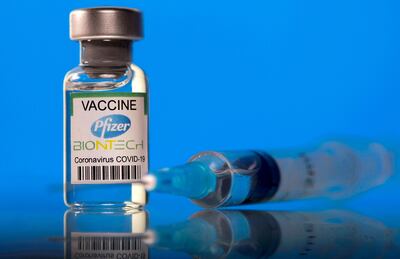Pfizer's share price jumped by 1 per cent in premarket trading as the company said third-quarter net profit soared on the strong performance of its vaccine manufacturing arm, which prompted the drug maker to raise its 2021 forecast.
New York-based Pfizer’s net profit increased to $8.15 billion in the three months to the end of September, from $1.46bn in the same period last year, beating analyst estimates. It was up 46.4 per cent on a quarterly basis.
Revenue more than doubled annually to more than $24bn, exceeding analysts’ estimates of $22.8bn. The company raised its coronavirus vaccine sales forecast for 2021 to $36bn.
“While we are proud of our third-quarter financial performance, we are even more proud of what these financial results represent in terms of the positive impact we are having on human lives around the world,” said Albert Bourla, Pfizer’s chairman and chief executive.
Pfizer said it remains on track to achieve its goal of delivering at least two billion Pfizer-BioNTech vaccine doses, marketed as Comirnaty, to low- and middle-income countries by the end of 2022.
“At least one billion [doses] to be delivered this year and one billion next year, with the possibility to increase those deliveries if more orders are placed by these countries for 2022,” Mr Bourla said.

One billion of these doses will be supplied to the US government at a not-for-profit price to be donated to the world’s poorest nations.
“Our ultimate goal is to help bring this pandemic to an end as quickly as possible, but also to apply the lessons we have learnt through our work on the vaccine to all of our therapeutic areas. We look forward to providing future updates on these efforts,” Mr Bourla said.
More than 75 per cent of the sales the company recorded through the third quarter for Comirnaty have come from supplying countries outside the US.
Pfizer’s vaccine manufacturing arm added more than 60 per cent to the overall revenue. It registered 749.3 per cent year-on-year jump in sales to $14.6bn in the third quarter.
Its internal medicine unit sales surged 1 per cent yearly to more than $2bn in the three-month period. Revenue from the oncology unit increased by almost 12 per cent on an annual basis to more than $3bn.
The company’s hospital unit contributed almost $2.4bn in sales, almost 32 per cent more than the prior year period.
All units of Pfizer showed good growth in the third quarter, except the company’s inflammation and immunology department that added more than $1bn in sales, a yearly drop of 7 per cent.
The company now expects its full-year revenue in the range of $81bn to $82bn, compared with $78bn to $80bn announced earlier.
Adjusted earnings per share are projected to reach $4.1 to $4.2, up from the previous prediction of $3.9 to $4. The company expects to deliver more than 2.3 billion vaccine doses this financial year, earning $36bn.
“We continue to make progress on advancing our internal pipeline across all therapeutic areas while also prudently deploying our capital through partnerships and bolt-on acquisitions,” said Frank D’Amelio, chief financial officer and executive vice president for global supply at Pfizer.
It will help the company “to gain access to cutting-edge platforms, science and technologies that could potentially bolster our growth in the latter half of this decade”, he added.
During the first nine months of the fiscal 2021, Pfizer paid $6.5bn of cash dividends, or $1.17 per share of common stock, which represents an increase in dividends per share of 3 per cent compared to the same period last year.


